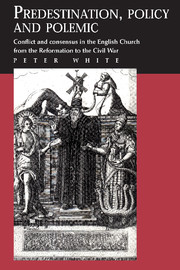 Predestination, Policy and Polemic
Predestination, Policy and Polemic Book contents
- Frontmatter
- Contents
- Preface
- Acknowledgements
- 1 The polemics of predestination: William Prynne and Peter Heylyn
- 2 The theology of predestination: Beza and Arminius
- 3 Early English Protestantism
- 4 The Elizabethan church settlement
- 5 Elizabeth's church: the limits of consensus
- 6 The Cambridge controversies of the 1590s
- 7 Richard Hooker
- 8 The early Jacobean church
- 9 The Synod of Dort
- 10 Policy and polemic, 1619–1623
- 11 A gag for the Gospel? Richard Montagu and Protestant orthodoxy
- 12 Arminianism and the court, 1625–1629
- 13 Thomas Jackson
- 14 Neile and Laud on predestination
- 15 The personal rule, 1629–1640
- Select bibliography
- Index
8 - The early Jacobean church
Published online by Cambridge University Press: 11 September 2009
- Frontmatter
- Contents
- Preface
- Acknowledgements
- 1 The polemics of predestination: William Prynne and Peter Heylyn
- 2 The theology of predestination: Beza and Arminius
- 3 Early English Protestantism
- 4 The Elizabethan church settlement
- 5 Elizabeth's church: the limits of consensus
- 6 The Cambridge controversies of the 1590s
- 7 Richard Hooker
- 8 The early Jacobean church
- 9 The Synod of Dort
- 10 Policy and polemic, 1619–1623
- 11 A gag for the Gospel? Richard Montagu and Protestant orthodoxy
- 12 Arminianism and the court, 1625–1629
- 13 Thomas Jackson
- 14 Neile and Laud on predestination
- 15 The personal rule, 1629–1640
- Select bibliography
- Index
Summary
It has been argued thus far that the theological polarity of the late-Elizabethan period represented a departure from a central tradition which kept the debate on predestination out of the limelight, steered a middle course between extremes, and avoided too precise a definition of controverted questions. The challenge to that tradition came first from those who pressed for Bezan orthodoxy, and then from Harsnett and the outspoken anti-Calvinist followers of Baro: but even in the 1590s, it has been suggested, characteristically mediating and moderating influences were represented by the two archbishops and their advisers.
The same spectrum was reflected in the early Jacobean church. ‘Calvinists’ and ‘anti-Calvinists’ (often called Arminians avant la lettre or even simply Arminians) represented extremes into which the majority of churchmen cannot without distortion be made to fit. Theologically most of them belonged in the centre, like Bancroft: and their standpoint was supported decisively by James I, who in the debates at Hampton Court rejected the attempt to modify the official formularies in a Calvinist direction.
The Hampton Court Conference
The fulcrum of all recent discussion of the Hampton Court Conference is an article by Professor Mark Curtis which argued that William Barlow's contemporary record has seriously misled historians in portraying it as a failure for the Puritan cause. He drew attention to the importance of an alternative, anonymous, account in which the king is represented as having acted independently of his bishops, and to have been more sympathetic to Puritan aspirations than Barlow's account would lead us to suppose. The king's independence bore fruit in the decisions made at the conference, which represented real concessions to the Puritans.
- Type
- Chapter
- Information
- Predestination, Policy and PolemicConflict and Consensus in the English Church from the Reformation to the Civil War, pp. 140 - 174Publisher: Cambridge University PressPrint publication year: 1992
